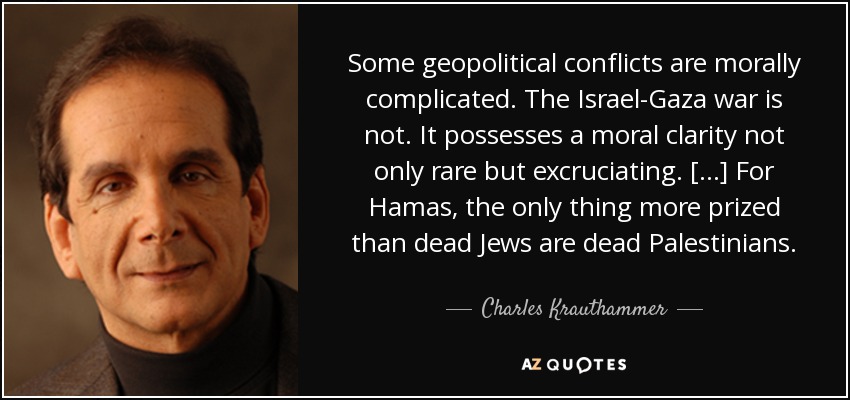‘They Forgot to Be Afraid’
Inquiries into the Yom Kippur War failures led to major changes in Israel’s military structure and political leadership—including the end of Prime Minister Golda Meir’s storied career. And yet here we are, 50 years later, grappling with another catastrophic failure of sensemaking on the part of Israel’s political, intelligence, and military elites. And this could be the hardest lesson of the post–October 7 reckoning: Identifying and even punishing these failed leaders might be necessary, and indeed, cathartic. But it won’t be sufficient. The problems lie deeper than any group of individuals. “Locating blame in individuals perpetuates the problem,” Vaughan writes. The people thought to be at fault can be fired or even jailed, “but unless the organizational causes of the problems are fixed, the next person to occupy the same position will experience the same pressures and the harmful outcomes will repeat.”Noah Rothman: The Anti-Jewish Violence Is Happening
It’s natural to be outraged at the leaders who failed to anticipate this horrific assault. But, unlike in a disaster, we should reserve our deepest anger for the people who ordered and carried out this exercise in primitive barbarity. Emily Harding, an analyst with the Center for Strategic and International Studies, writes that intelligence collapses like 9/11 and October 7 “are often failures of imagination.” They occur when leaders and analysts “neglect to think as big and as ruthlessly as their enemy.” Maybe we shouldn’t be shocked that Israel’s military and intelligence leaders failed to imagine the depths of Hamas’s depravity. Perhaps—and I know this is asking a lot—we should try to summon a bit of empathy for officials whose notions of military threats didn’t include mass rape and babies in ovens.
No doubt all these questions will be hashed out in the coming years of inquiry and attempts at reform. But that will have to wait. As Israeli forces were still engaging the last Hamas terrorists, a reporter asked IDF military spokesman, Rear Admiral Daniel Hagari, about the status of the investigation into military and intelligence failures. His response: “First, we fight, then we investigate.”
The academic theories that buttress anti-Semitism were made operational in 2019 in the effort to compel House Democratic leaders to back down from their effort to censure Representative Ilhan Omar for her flagrant anti-Semitism. The backlash from the left was wildly successful. Because she wanted the censure, House Speaker Nancy Pelosi was dubbed by Linda Sarsour a “typical white feminist upholding the patriarchy doing the dirty work of powerful white men.” Representative Alexandria Ocasio-Cortez agreed. “No one seeks this level of reprimand when members make statements about Latinx + other communities,” she insisted. “We all have a responsibility to speak out against anti-Semitism, Islamophobia, homophobia, transphobia, racism, and all forms of hatred and bigotry,” then senator Kamala Harris wrote. And yet, “the spotlight being put on Congresswoman Omar may put her at risk.”Meir Y. Soloveichik: Scalia’s Prophecy
A united front emerged, and Democratic leadership was convinced to subordinate its better instincts to the social justice solidarity movement that formed around Omar. In the end, the caucus produced not a censure of Omar’s prejudice but a watery statement of general opposition to bigotry in whatever form it takes. Sound familiar?
The least charitable interpretation of the Democratic establishment’s internal turmoil in the weeks that passed since the 10/7 attack is that its leading lights are inveighing against the scourge of Islamophobia to give cover to anti-Semitic elements within their coalition. And it is not without evidence—the evidence of years of cowardice, caviling, and making deals with the devil.
Progressives and liberals alike abetted decades of policy preferences, campaigns to coerce and cajole donors, indefensible tenure-track recommendations, efforts to debase humanities departments, and the creation of a media-academic industrial complex designed to house the products of this ill-considered education. They built an elaborate new lie—the threat of “Islamophobia”—that hijacked the enduring reality of the world’s oldest lie. It should be a source of profound unease to all people of good will, and to all people who fear the consequences of these apologia for anti-Semitism, that the White House’s first instinct when confronted with the rotten fruits of their coalition’s labors is to throw yet another lie on the pile.
On May 8, 1997, Supreme Court Justice Antonin Scalia delivered what may have been the most important speech of his life. Strikingly, the address had nothing to do with jurisprudence; it made no mention of the Constitution or of the originalism that had marked his career. Delivered in the Capitol Rotunda, the justice’s remarks focused on the horrors of history, yet Scalia looked to not only the past but also the future. His words, now printed in the vital volume Scalia Speaks, have proved terrifyingly prescient.The Inside Story of How Palestinians Took Over the World
The occasion of the address was a ceremony marking Holocaust Memorial Day. The justice reflected that, as honored as he was to participate, he found the invitation difficult to undertake as a non-Jew: “I am an outsider speaking to an ancient people about a tragedy of unimaginable proportions that is intensely personal to them.” Scalia further reflected, “I am not only not a Jew, I am a Christian,” and said he believed that the anti-Semitism in Christendom had “helped set the stage for the mad tragedy that the National Socialists produced.” He stressed, however, that for him, the ceremony of the day was personal: “When I was a young man in college, spending my junior year abroad, I saw Dachau. Later, in the year after I graduated from law school, I saw Auschwitz. I will of course never forget the impression they made upon me.”
These remarks were interesting enough, but the most important part of the speech was yet to come. Scalia stressed that it was not enough to remember the Holocaust. Rather, he said, one must mark the sort of society in which it occurred: “The one message I want to convey today is that you will have missed the most frightening aspect of it all, if you do not appreciate that it happened in one of the most educated, most progressive, most cultured countries in the world.” The Germany of the early-20th century, he noted, “was a world leader in most fields of art, science, and intellect.” Its universities were some of the most celebrated on earth. Yet this did not prevent Nazism from suffusing society; in fact, German education and Nazism went hand in hand.
Then, suddenly, Scalia switched from past to present and focused on his own family: “This aspect of the matter is perhaps so prominent in my mind because I am undergoing, currently, the task of selecting a college for the youngest of my children—or perhaps more accurately, trying to help her select it.” American parents, Scalia reflected, place so much value today on what is taught in academic institutions, yet the opportunities afforded there, he argued, are “of only secondary importance—to our children, and to the society that their generation will create.” The Holocaust, Scalia argued, is a reminder of the importance of imparting moral wisdom above all else, and it is this, he was implicitly saying, that parents must bear in mind as they ponder the intellectual future of their progeny.
The brilliant Palestinian plan to capture the pliable minds of American college students was laid out in front of me 25 years ago, during a very sinister business meeting in Israel.
It was around the time of the Oslo Accords. I had been hired by the Ford Foundation to create a marketing institute for their grantees in the country. Ford was funding the operations of both Jewish and Arab organizations within the Israeli green line, in an effort to help build a vibrant liberal civil society.
Ford put me in partnership with a young Israeli woman, Debra London. (Debra, now one of my closest friends, has just been selected to head up fundraising for the rebuilding of Kibbutz Be’eri.) She and I drew up a plan to interview each of the grantees, as well as Israeli ad agencies and media firms. While we wanted to learn about the grantees, we also planned to secure free marketing work and media to be an essential part of the institute.
When we interviewed the Jewish organizations, the atmosphere was almost giddy with hope, possibility and belief in Shimon Peres’s new Middle East. Each organization we interviewed talked excitedly about peace and co-existence, a flourishing economy among both the Jews and the Palestinians, collaborative projects and interchanges.
But when we interviewed the Arab organizations, the word “peace” never passed their lips. They spoke of independence, dignity, self-rule, a state. One person even told me she would never use the word “du-kiyum” (co-existence). “There is no such thing as co-existence,” she stressed. “We are just the tenants living on the property that the Jews now own. That’s not a balanced co-existence.”
I tried to explain to my fellow Jewish liberals that we — the Jews and the Arabs — were having two very separate conversations. We were talking “peace.” They were talking “independence.” But as the weeks of interviews progressed, I found the Arab organizations were talking about a whole lot more.













































